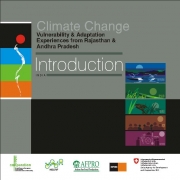People and Organisations
Robert Chambers speaks about health, nutrition, sanitation and CLTS at the International Development Select Committee on the future of DFID's programme in India
Posted on 01 Mar, 2011 03:18 PMHe spoke about health, nutrition and sanitation in India and specifically referring to CLTS.
Download the below attachment for written evidence given by Robert Chambers
Open letter to Jairam Ramesh on POSCO project approval from the Mining Zone People's Solidarity Group
Posted on 28 Feb, 2011 01:45 PM
Water management in the Vijaynagar empire - Paper presented at the National Seminar on Water and Culture (2007)
Posted on 14 Feb, 2011 01:55 AMThis paper focuses on water management techniques used in two tanks constructed by the kings of the Vijaynagar Empire.
The first example taken, is that of the Anantraj Sagar built by the son of the minister of Harihar. The lake is still in use and there are inscriptions on stone near it which provide a thumb rule to constructing lakes. Construction of this lake began in 1369 and was completed in 2 years. The paper states that the length of the dam was 5000 dand, width was 8 dand and the height was 7 dand (One dand is about one metre).
GRAMICID Food graded disinfectant for water and food Industries
Posted on 07 Feb, 2011 06:07 PMGramicid for Dairy & Ice-cream Industry Sanitation: The Dairy Industry maintains a high growth rate throughout the year. The Quality guidelines enforced upon the Industry are stringent and the product quality can only be generated through continuous Quality Control Measures.
Using media to address water issue in Rajasthan - Video Volunteers
Posted on 28 Jan, 2011 12:00 PMDuring her yearlong stay, Tara trained at least twenty people into video production some of whom have succeeded in finding work in the local market as photographers, cameramen and wedding video makers. In this blog she gives a vivid account of the CVU, its producers and their work.
SRI - Less seeds, water , fertilisers lead to greater yields
Posted on 18 Jan, 2011 11:21 PMBHUBANESWAR, India, Dec 29, 2010 (IPS) - When French Jesuit priest and passionate agriculturist Henri de Laulanie developed the System of Rice Intensification (SRI) method of cultivation for Madagascar’s poor farmers in the 1980s, he probably had no idea that millions of farmers elsewhere in the world would one day benefit from it as well.
Sanitation is sexy challenge : Winners announced
Posted on 07 Jan, 2011 10:54 AMArticle and Image Courtesy: Acumen Fund
Author: James Wu
 The judges votes are in, and we’re excited to announce the winners for the Search for the Obvious Sanitation is Sexy challenge.
The judges votes are in, and we’re excited to announce the winners for the Search for the Obvious Sanitation is Sexy challenge.
Benchmarking local government performance on rural sanitation in Himachal Pradesh - A learning note by WSP
Posted on 06 Jan, 2011 06:43 AMThis document deals with benchmarking local government performance on rural sanitation in Himachal Pradesh. To strengthen outcome-focused management of the rural sanitation sector in India, the Water and Sanitation Program’s (WSP) Global Scaling Up Sanitation Project, in partnership with the Government of Himachal Pradesh, developed a five-step process to monitor and benchmark performance on a monthly basis across all twelve districts in the state. Applied at the local government (district) level, this process has proven to be an effective approach, one that can improve reporting, monitoring, and performance.
Maharashtra Groundwater (Development and Management) Bill (2009)
Posted on 05 Jan, 2011 07:32 PMThe Maharashtra Groundwater (Development and Management) Bill, 2009 aims to facilitate and ensure sustainable and adequate supply of groundwater of prescribed quality, for various category of users, through supply and demand management measures, protecting public drinking water sources and to establish the State Groundwater Authority and District Level Authorities to manage and to regulate, with community participation, the exploitation of groundwater within the State of Maharashtra.
Climate change: Vulnerability and adaptation experiences from Rajasthan and Andhra Pradesh – A report by SDC
Posted on 05 Jan, 2011 06:44 PM This document discusses the process oriented programme of Swiss Agency for Development and Cooperation (SDC) on Vulnerability Assessment (V&A) and Enhancing Adaptive Capacity to Climate Change initiated in the semi-arid regions of India. The aims of this programme include strengthening the resilience of local communities to conditions of unfavourable weather, like adverse alterations in temperature and precipitation leading to the more frequent occurrence of drought and to use the experiences for policy development for climate change adaptation measures at various levels.
This document discusses the process oriented programme of Swiss Agency for Development and Cooperation (SDC) on Vulnerability Assessment (V&A) and Enhancing Adaptive Capacity to Climate Change initiated in the semi-arid regions of India. The aims of this programme include strengthening the resilience of local communities to conditions of unfavourable weather, like adverse alterations in temperature and precipitation leading to the more frequent occurrence of drought and to use the experiences for policy development for climate change adaptation measures at various levels.
Over 60 per cent of the cultivated area in India is rainfed & unfavorable and uncertain rainfall patterns will seriously affect the food, drinking water and livelihood security of millions of children, women and men. Since the initiation of this project, the emphasis on proactive research on adaptation mechanisms has increased at the national level.
The present decade may mark the beginning of a new climate era, characterized by extreme and often unpredictable weather conditions and rise in sea levels. The greatest casualty of climate change will be food, water and livelihood security.